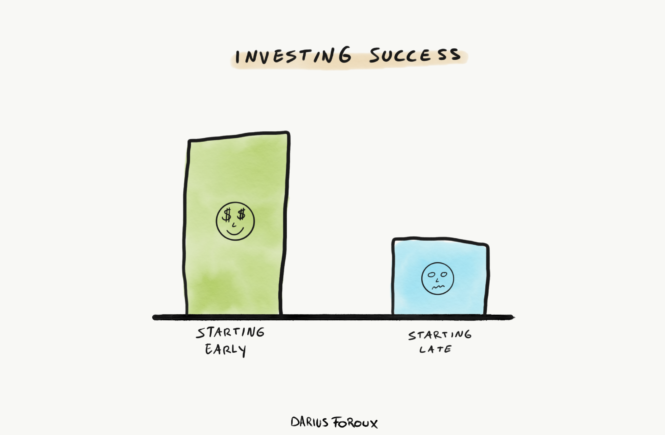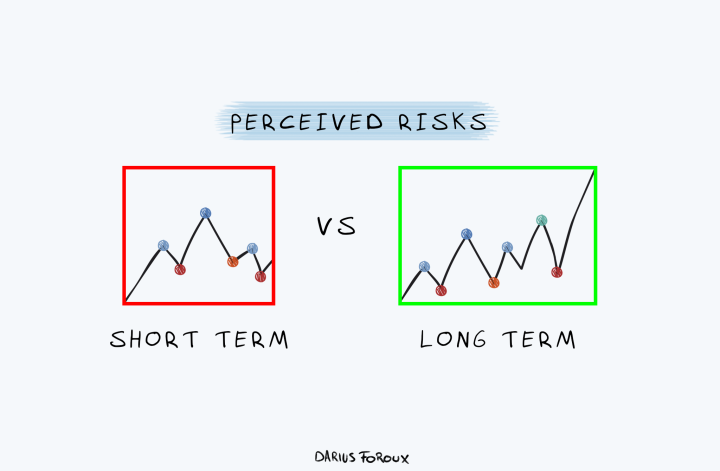“The S&P500 was up 30% last year! I need to get in on that.” Every few months, you hear that all kinds of people got rich by investing in the latest trendy thing. And you, my friend, missed out.
One moment we all need to get into real estate, the other moment index funds are the best thing, and then it’s gold.
Before you know it, you’re sitting in a hotel conference room with a dozen strangers, listening to a presentation about timeshares. “Can it get better than this? Buy a vacation home, enjoy it, AND make money off it the rest of the year!”
Where’s the dotted line? I’m ready to sign.
Oh wait, I changed my mind, I’d rather go to a casino and bet all my money on red at the roulette table. Look, I’m making fun of those things because I’ve been there too. I’ve lost money on stupid deals.
“But what about Warren Buffett?”
The general investing sentiment is that you must invest all your money right away. What’s with all the rush? One of the biggest misconceptions about investing is that everybody must start early. This fallacy goes so far that some people never invest at all because “It’s too late to get started now.”
Starting early might have worked out for Warren Buffett, but for most people, it’s better to wait. In fact, Buffett himself often speaks on patience. He also believes that sometimes it’s better to do nothing:
“You do things when the opportunities come along. I’ve had periods in my life when I’ve had a bundle of ideas come along, and I’ve had long dry spells. If I get an idea next week, I’ll do something. If not, I won’t do a damn thing.”
“But the earlier you start, the more money you can make!” That’s what a lot of folks say. I get it, only looking at the upside is tempting. When you look at historical returns of the stock market, it’s a pretty picture. If you look at how the S&P500 has performed over the past 30 years, you’ll see a steady increase.
That’s wonderful. But if you’re not ready to invest, you’re not ready. Unless you’re pursuing a full-time career in investing, the purpose of investing is not to make money. Too often, we assume we can instantly make passive income by investing our money. But where does that initial money come from? You can borrow money, but that always comes at a price.
When you borrow money, you’re obligated to pay it back. Borrowing money to invest in the stock market or real estate is not free. When’s the last time someone said, “Here’s some free money.” We all know that there’s no such thing. And yet, we believe in investing fairy tales. What we really need is to find a sure way to generate money.
Investing in yourself pays off
Too often, we get ahead of ourselves by imagining a financially free life. But investing in yourself will give you more freedom than only having money. Again, I’m inspired by Warren Buffet, who said that “The most important investment you can make is in yourself.”
Once I improved my skills, started to generate money, paid off my student debt, and saved enough cash to cover my expenses for a year, I started investing. In that order. To me, investing is the last step towards freedom—not the first.
Just realize that investing is not a way to make money for most of us. It sounds counterintuitive, but your decision to ignore investing will save you a lot of time and money. Too often, we waste our time pursuing financial “opportunities.” When you don’t have enough savings and are putting your money in individual stocks, timeshares, bitcoin, or gold, you’re wasting your energy. Financial experts promise that you will make money with investing. In reality, it’s not that easy.
The purpose of your career or business is to make money. You see? First, you make money—then, you invest it. That’s how most of us build wealth. I only started investing seriously a couple of years ago. Until then, I was too focused on building a sustainable career and saving my money. But that doesn’t mean you should completely ignore investing. I recommend learning more about investing as you are working and saving your money. Here are the steps I took to get started with investing:
- I started reading about the different ways people invest: Stocks, index funds, mutual funds, 401K, real estate, businesses, etc.
- I read books and articles on investing
- I sought out real estate investors I knew to learn more about their strategies. I think that real estate is one of the few things you can’t learn from books. You need to talk to people in your city and country. And you need to look at a lot of properties to understand what’s important to profitable real estate investing.
- Step one through three took me three to four years. It’s a slow process.
- Once I learned more about investing, I decided to only focus on local real estate (because I know my city) and index funds. I’ve eliminated everything else. No mutual funds, no single stocks, no bitcoin, no exotic investments, nothing overseas.
- I’ve narrowed down my investment strategy even more. I only invest in the Vanguard S&P500 index fund. No bonds or other index funds for now.
- When it comes to property, I’m currently focused on one-bedroom apartments in the city center because there’s always been a high demand.
Everybody prefers their own investing strategy. One of my friends only invests in commercial real estate. Another friend hates real estate because it takes time to look at properties, get funding, and manage the property. He prefers index funds and bonds.
Investing is like philosophy. There are a lot of philosophies, and there’s no right or wrong way to invest as long as you’re achieving results. No matter what you do, make sure you do something that works. Losing money sets you back for years.
Investing is also about expectations. I don’t expect to become a full-time investor. I’m a full-time author and entrepreneur. That’s my career. I invest some of the money I make in real estate and index funds. That strategy is meant to make me wealthy over the next ten, twenty, thirty years.
Not tomorrow. And if you’re not ready to invest now? Then don’t. Educate yourself, make a living, save your cash, and then act. By simply avoiding stupid and irresponsible decisions early on, you will increase your likelihood of becoming wealthy.




